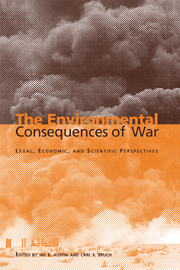Book contents
- Frontmatter
- Contents
- List of illustrations
- List of tables
- List of contributors
- Acknowledgements
- Foreword by Klaus Toepfer
- Introduction
- Part I General principles
- Part II The legal framework
- Part III Assessing the impacts – scientific methods and issues
- Part IV Valuing the impacts – economic methods and issues
- Part V Prospects for the future
- Introduction
- 22 Protecting specially important areas during international armed conflict: a critique of the IUCN Draft Convention on the Prohibition of Hostile Military Activities in Protected Areas
- 23 The Chemical Weapons Convention: a verification and enforcement model for determining legal responsibility for environmental harm caused by war
- 24 International legal mechanisms for determining liability for environmental damage under international humanitarian law
- 25 Waging war against the world: the need to move from war crimes to environmental crimes
- Epilogue
- Index
25 - Waging war against the world: the need to move from war crimes to environmental crimes
Published online by Cambridge University Press: 04 August 2010
- Frontmatter
- Contents
- List of illustrations
- List of tables
- List of contributors
- Acknowledgements
- Foreword by Klaus Toepfer
- Introduction
- Part I General principles
- Part II The legal framework
- Part III Assessing the impacts – scientific methods and issues
- Part IV Valuing the impacts – economic methods and issues
- Part V Prospects for the future
- Introduction
- 22 Protecting specially important areas during international armed conflict: a critique of the IUCN Draft Convention on the Prohibition of Hostile Military Activities in Protected Areas
- 23 The Chemical Weapons Convention: a verification and enforcement model for determining legal responsibility for environmental harm caused by war
- 24 International legal mechanisms for determining liability for environmental damage under international humanitarian law
- 25 Waging war against the world: the need to move from war crimes to environmental crimes
- Epilogue
- Index
Summary
When two elephants fight, it's always the grass that gets hurt.
Introduction
Over the past century, the international community has shown considerable concern for the humanitarian consequences of war. Examples of this concern include the adoption of the four 1949 Geneva Conventions on the law of war, public condemnation of the use of landmines, and the creation of non-partisan international criminal tribunals in the former Yugoslavia and Rwanda. Negotiations have established a permanent International Criminal Court, principally designed to adjudicate genocide and crimes against humanity.
The international community has been more hesitant in accounting for the environmental consequences of war. This reluctance exists notwithstanding the severity of military damage to the environment, often intentionally inflicted. In a sense this is no surprise. Modification and desecration of the natural environment is seen by many as a strategic mechanism to safeguard state sovereignty. In large part, such activity remains permissible because there is no definitive or readily enforceable code of conduct governing what warring parties can and cannot do to the environment. All the international community has been able to negotiate are scattered collateral references in a variety of treaties and conventions. At most, these references provide some definitional parameters as to what constitutes unacceptable treatment of the environment in times of war. These are summarized in the next section of this chapter, with special attention to the definition of environmental war crimes in the treaty that created the new International Criminal Court.
Notwithstanding the often limited and ambiguous scope of these definitions, they do provide a starting point for more protracted discussion.
- Type
- Chapter
- Information
- The Environmental Consequences of WarLegal, Economic, and Scientific Perspectives, pp. 620 - 646Publisher: Cambridge University PressPrint publication year: 2000
- 9
- Cited by



